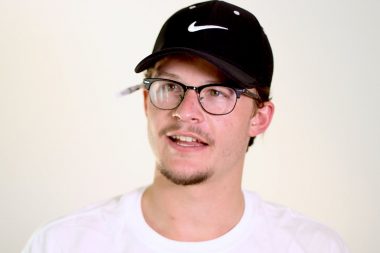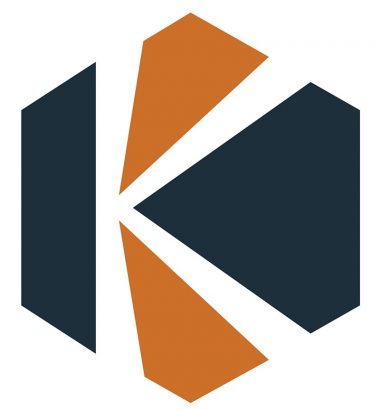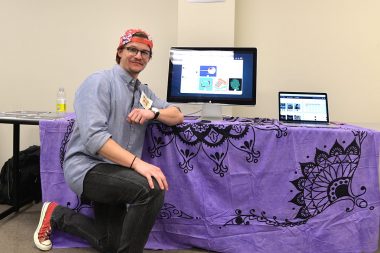Kelly Foran ’15 G’16 was accepted this summer into a startup accelerator program run by Groundwork Labs, a Durham-based organization that helps entrepreneurial ventures get off the ground.

The recent graduate of Elon’s Interactive Media master’s program has instead put his effort and energy into Kollaboh, a collaboration platform startup that he developed with fellow iMedia grad Carolyn Fonzi ’15, G’16.
This summer Foran is devoting all of his attention to Kollaboh thanks to his acceptance into a startup accelerator program run by Groundwork Labs in Durham. This competitive, two-month initiative helps fledgling companies hit the ground running by providing office space, mentorship, professional connections and general entrepreneurial knowledge — all at no cost.
“I’m in shock that I’m doing this now instead of having to find a job,” Foran said. “I consider myself so fortunate to be in this situation because I’m working on something I care about.”
Assistant Professor Derek Lackaff commended Foran for becoming the master’s program’s first Groundwork Labs participant, which will allow him to take “his idea to the next level.”
“The opportunity at Groundwork will put Kelly in touch with other professionals, help him build a network, and provide a lot of support — legal support, financial support, technical support — that a startup needs,” Lackaff explained. “He will be working with other people who are also enthusiastic about getting their ideas off the ground. This is really significant for him and his idea.”

While the term “startup” accurately describes Kollaboh’s status, the platform’s development dates back more than two years.
In summer 2014, Foran, a marketing major with a music business focus, was enrolled in the Elon in LA program and landed not one but two internships in the music industry. He split his time between Vitalic Noise, an independent label, and Interscope Records, a major label.
“At that time, I really wanted to work in the music industry,” he said. “Those two experiences were awesome because they were very different but very much related. I was constantly interacting with artists and seeing different collaborations occurring over and over, and that’s when my fascination and passion for collaboration — artistic collaboration — ignited for me.”
This interest sparked because Foran saw firsthand how a muddled creative process could exasperate artists.
“I got to see all the frustration around collaboration on the artists’ side,” he said. “They would be frustrated about the process, or the communication, or even lost files. I kept thinking this shouldn’t be the cause.”
“People love to collaborate, but why was the process so chaotic?” Foran wondered.
Once he returned to campus, Foran’s desire to help creatives connect persisted, leading to conversations with Elon student artists, faculty and staff. He found that while people valued collaboration, there were many obstacles to the process, including a heavy reliance on word of mouth to expand one’s networking circle.
“A lot of students just don’t have those important connections they need,” he said. “So this platform had to be social, allowing artists to find one another. I found out that some people felt siloed from each other.”

In late 2014, Foran partnered with Fonzi, who facilitated the creative and development aspects of the project, while he concentrated on the business and marketing side. During the next few months, the two Elon undergraduates developed the platform’s concept, working on wire frames, prototypes and user experience issues.
Foran said he became absorbed by this pursuit, leading the Chicago native to choose the iMedia program over employment, with plans to team with Fonzi – who also enrolled in the graduate program – to make Kollaboh their capstone project. During the 10-month program, they continued to brainstorm, develop and make Kollaboh a reality.
In its current state, Kollaboh consists of a landing page, informational video and descriptions of what the platform hopes to provide. While it’s just a foundation, the process has far exceeded Foran’s initial vision. “The platform has undergone a lot of changes, and it’s vastly different from what I started with, but the core has always been focused on facilitating collaboration,” he said.
Much of the credit for the platform’s development belongs to the Elon community, Foran noted.
“The iMedia program has been a huge part in this undertaking,” he said. “Every one of my iMedia professors has influenced this project and my drive in some way. Carolyn has been a major help, handling work I could never do. Even the faculty and students I spoke with my senior year made a big contribution. Really, this has been an accumulation of thoughts and ideas — about something I feel needs to exist for artists and the creative community to continue to grow.”
Approximately halfway through the Groundwork Labs program, which began in mid-May, Foran has focused on unpacking Kollaboh’s potential. His time has been dedicated to research, conversing with local artists, building a business model canvas, and identifying key partners, including customers.
“The incubator is really focused on finding the perfect product market fit,” Foran said. “And the support system is what I was looking for, to be surrounded by people who are in this high-intensity, but highly passionate environment. It’s a place where people are trying to do something that has never been done before.”
Assistant Professor William Moner applauded Foran for not taking shortcuts as he develops his platform, focusing his attention on building a plan before creating a product.
“Kelly’s impressive because he continues to drive forward with ideas and execute on them,” Moner said. “He is very good at the research side, which is something that gets discounted in the push for interactivity. That is where he’s spent the most time, getting out into the field and researching with people using the products, doing surveys and user testing, and getting in front of his intended audience. That instinct is rare for students to have, and Kelly has it.”


